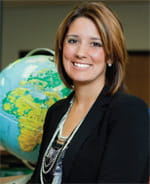
Every nine weeks during the school year, middle school teacher Christine Austin watches a new group of students grumble and groan on their way into her Writing Enrichment class at Osborne Middle School in Hoschton, Ga.
Hers is a classroom of struggling writers who have been identified as being at risk of failing the state standardized writing test. Many have been told for years that writing is their weakness.
“Ninety-nine percent of my students walk into class on the first day and dread it,” says Austin, who earned an MS in Education in 2007 from Walden University. A seven-year veteran of the middle school classroom, Austin sees it as her mission to not only get these kids writing but also help them see what good writing skills can do for them both in the classroom and in the world awaiting them.
Dr. Lisa Noga, MS in Education ’04, is a witness to the transformation of Austin’s students from reluctant writers to enthusiastic learners.
“I enjoy watching her students’ confidence soar as the quarter progresses,” says Noga, whose Science Enrichment class is adjacent to Austin’s classroom. “It’s apparent that Christine has built a genuine rapport and community of trust amongst her students.”
On the first day of class, Austin asks her students whether writing is important. They have a hard time understanding why we need to write, she says. Instead of making sure sentences are constructed with fluency and meaning, students today rely on the “tech talk” they’re accustomed to in text messages and email. Many young people are losing the art of effective communication and are tossing aside the foundations of the English language, Austin adds.
Her classroom is unique to Gwinett County—and there’s a reason for that. Austin saw the need for such a program and put it together four years ago. Students in the sixth through eighth grades are identified based on need and then assigned to Austin’s class. Classes may include students who are in the special education program, average students, or gifted students. Some students are in need of remediation, while others simply need to be challenged.
In developing the program, Austin applied what she’d learned while pursuing her master’s degree from Walden, which focused on curriculum instruction and assessment. She used the tools she’d gained from her studies to better plan instruction for the program, she says. Austin also says that throughout her studies, she became more aware of the concept of social impact.
“I feel like I need to be acutely aware of what my students are doing in the classroom and how, in turn, I can help them be productive members of society,” she says.
Although Austin is a devoted teacher, she admits that the profession wasn’t on her radar when she was younger. In college, she explored several majors. It wasn’t until her junior year at the University of Georgia in Athens that she decided to go into education as a means of marrying her love of writing and literature with the joy of helping people and learning.
“I’m a lifelong learner,” says Austin, a go-getter who had two babies while earning her master’s degree. “I will always be in school.”
While continuing to work full-time and teach an online high school language arts class, Austin has returned to Walden to earn her Doctor of Education (EdD) to become an expert in instructional strategies for low-performing writers. The best way to do so, she says, is to immerse herself in the literature and be with people with similar goals.
“In the online learning environment, it’s important to have a strong foundation of colleagues who have a similar focus,” says Austin, who often called university faculty members with questions or reached out to other Walden students. “Walden does an excellent job of really emphasizing that strong camaraderie.”
A recipient of Walden’s Presidential Scholarship, which is awarded to master’s-level alumni who want to pursue a doctoral degree, Austin believes that it’s in her students’ best interest that she earns her Ed.D. She says that by becoming a better teacher, she can have an even greater impact on her students.
For Austin, the reward comes when she witnesses that transformation in her classroom. When students begin to enjoy the writing process and their confidence levels begin to soar, she sees them gain a sense of pride and the strength to take on the world beyond her classroom walls.
“That’s what makes it worthwhile for me,” she says.
Tell us what mission your second Walden degree is helping you achieve at [email protected].



